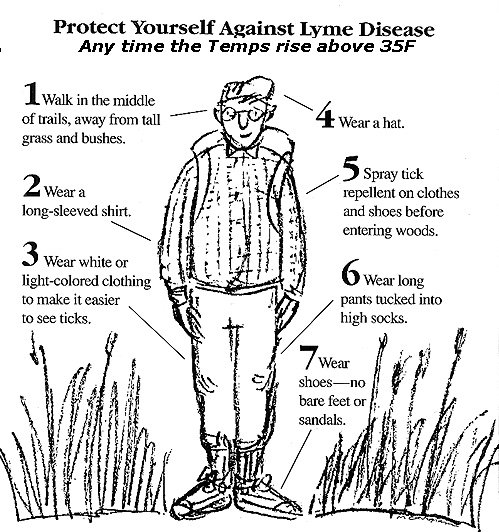Don't let bugs bug you: summer safety
For alt text for screen readers, click here.
Because I'm from the southern US, I'm no stranger to bugs: gnats, flies, mosquitoes, ticks, etc. It felt almost like an initiation into the South to be covered in bug bites, but now we know that the common "summer bugs" can spread a lot of nasty diseases!
I experienced this first-hand when I contracted Rocky Mountain Spotted Fever (RMSF) in high school and second-hand when some friends and family had Lyme Disease and Ehrlichiosis. Since then, I've been trying to educate others on the risks that bug bites carry, and especially ticks in the summer months.
So how do you prevent bug bites?
Prevention is ALWAYS the best option when dealing with diseases. Thankfully there are several things that you can do to prevent bug bites:
Wear bug repellent with DEET
DEET (or N,N-diethyl-meta-toluamide) is the most effective bug repellent available and repels most biting insects like ticks and mosquitoes. It is safe for the vast majority of people, even pregnant people and children, and can be found in various types of products including sprays, roll on, wipes, and more. It's applied directly on the skin (avoid eyes, mouth, and open wounds) and works by making it difficult for bugs to smell you.
Read the NYT reviews of the best DEET repellents here.
Keep your dogs and cats safe too
Often, biting insects are brought in by pets. Make sure your dogs and cats are up-to-date on their flea and tick preventative (and heartworm too!). Though this should be done all year, it's particularly important during the summer when biting insects are the most active. Not only will this prevent your best friends from getting sick, but it will also help you stay safe too!
For feline flea and tick preventatives, click here.
For canine flea and tick preventatives, click here.
***Please DO NOT use Hartz products ***
Cover your skin when going in infested areas
If you are going in an area that you know has a lot of bugs, in addition to wearing repellent, cover as much of your skin as possible. Wear lighter colored clothes with closed toed shoes and long pants and sleeved shirt, then tuck the ends of the pants into your socks or shoes. Wear a hat as well - some bugs drop down from tree branches above you! Wearing lighter clothes will make it easier to find any bugs that do bite you.
Also, you can have clothing treated to repell bugs with permethrin. If you can afford it and live in an area with a lot of insects and wear specific clothes, it's a great option!
Check it out here.
What if I get bitten?
Sometimes no matter how careful you are, you still get bitten. For any bug bite: try to avoid scratching it, keep it clean and dry, and apply calamine lotion to help the healing process. You can also apply hydrocortisone and other soothing, anti-itch creams. Make a note of when you got bitten and if you develop any symptoms of illness, let your provider know when you were bitten and what type of insect, if you know it.
For tick bites:
Check your entire body for ticks. Some ticks are very small, so look carefully! Ticks prefer dark, warm parts of the body, like places with skin folds - unfortunately, the groin too.
Try to remove the ticks as soon as you safely can. The longer a tick stays latched on, the more likely it is to spread diseases. If the tick is removed within 24 hours of the bite, the chances of it spreading disease is much lower.
Save the tick(s) in a plastic bag and write the date it was removed. If you develop symptoms of illness, bring the tick to your provider and they can test it, which is often faster than testing your blood.
Learn how to properly remove a tick:
Get clean tweezers
Grab the tick as close to the skin as possible
Pull up slowly with steady, even pressure ONLY
Wash your hands
Wash the area of the tick bite with warm soap and water, then put a small amount of rubbing alcohol or betadine
Place the tick in a plastic bag
After removing any tick(s) you see, take a bath with about 2 cups of white vinegar. Soak in it for 15-20 minutes.









